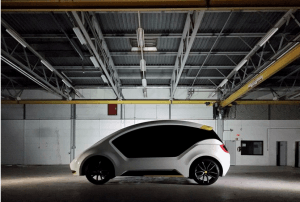
By Stu Robarts
Amber is based on the principles that car ownership is expensive and inefficient
Ride-sharing and carpooling services already offer ways to get around town without having to own a car. Dutch startup Amber also believes that car ownership is expensive and inefficient, and is launching a no-hassle on-demand car-sharing service that will feature its own electric car, the Amber One, that’s been specifically designed for sharing.
The firm argues that, despite paying for maintenance, taxes, insurance and fuel, owners typically only use their cars a small percentage of the time. The rest of of the time, they remain parked and unused.
The company is aiming to give users of its service access to a car within half an hour and within walking distance whenever they need one, but at a cost of only €33 (US$37) per week. It plans to spread the cost of running its fleet across its users and to minimize inefficiency and costs by keeping each car in use as much as possible. The real innovation, though, is not in the mobility-as-a-service model, which is similar to schemes operated by the likes of Turo and Maven, but the car itself.

The Amber One is an electric vehicle that has been designed from the ground up. Amber says it will be modular, so as to be easily upgradeable, and capable of doing 1.5 million km (932,000 mi) over the course of its lifespan. This modularity and long lifespan is another way Amber hopes to keep costs to a minimum.
Amber promises acceleration from 0-100 km/h (0-62 mph) in a respectable 7 seconds, courtesy in part of a low 650 kg (1,433 lb) weight. The top speed will reportedly be 150 km/h (93 mph), and the range 400 km (249 mi) per charge. Users will locate, unlock and start the cars using an accompanying app on their smartphone.
The first Amber One prototypes are expected to hit the roads next year, with small scale scheduled to begin in 2018. Amber intends to make its service first available in Eindhoven in 2020.
Meanwhile, the company has partnered with a car lease company for a corporate mobility program that’s due to kick off next month. Amber will make use of regular electric vehicles for this business to business model, which will also serve as a testing and development platform for the company’s software and services.
